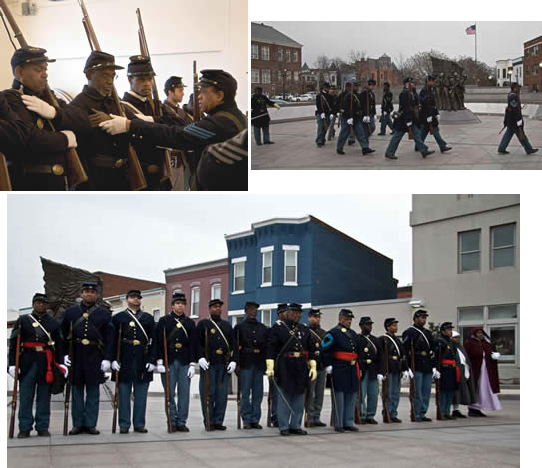54th Massachusetts Volunteer Infantry Makes History Again
SOLDIER
Worcester Telegram & Gazette
Sarah Gantz
Boston University Washington News Service
Jan. 19, 2009
WASHINGTON — Eli Biddle lied about his age. He was 16 in 1863, not 17, as he told the recruiters he met on the street. Mr. Biddle had been booted out of class for refusing to sing “My Country ‘Tis of Thee.” While wandering around Boston, he decided to join the army, even though he was one year shy of the age requirement.
Until those days following the Emancipation Proclamation, Mr. Biddle’s race would have been a more formidable barrier to enlisting. But the unit he joined was the newly formed 54th Massachusetts Voluntary Infantry, one of the first all-black army regiments.
“These people were fighting just to be called American. Now, we’re electing an African American president,” said Mr. Biddle’s great-grandson, Michael Coblyn, of Amherst, who is a member of a reenactment group of his great-grandfather’s regiment. “It’s something that was beyond their dreams.”
Tuesday, the Boston-based honorary unit will march in the inaugural parade in honor of the nation’s first black commander in chief and the men of the original 54th Infantry who, they say, helped make Barack Obama’s election possible.
“Way back when the 54th was fighting for freedom, they were also fighting for him to be in this position,” said Bobby Berry, 79, of Boston, during a break from drill practice at the African American Civil War Museum Sunday. “It was not all glory, and peaches and cream,” Mr. Berry, who plays a sergeant major, said of the infantry’s role in the Civil War and the civil rights movement.
The 54th was among the first official all-black regiments and is remembered for spearheading the Battle of Fort Wagner, in which the regiment suffered heavy casualties, but also demonstrated its dedication to the Union. “It opened America’s eyes to equality,” said Emmett Bell-Sykes, 35, who plays a second sergeant. “In that way, they were pioneers.”
Named the 54th Massachusetts Glory Brigade, after the movie “Glory,” which chronicles the regiment from its formation to the attack on Fort Wagner, the Boston group of enactors has been performing for schools and marching in parades since its founding in 1992.
Their main event is marching in the parade Tuesday, but since arriving in Washington Saturday, the brigade has been busy with a schedule of demonstrations, squeezing drill practice in between.
Sunday, the soldiers practiced standing at attention (heads up, shoulders back, heels together in a V, musket perpendicular to the right hip), while an officer adjusted the position of a man’s canteen and knapsack slung across his brass-buttoned wool jacket.
The brigade is a family tradition for Mr. Coblyn. His three sons are also members. His father, George, founded the group with Benny White, the current lieutenant. Mr. Coblyn’s oldest son, Christopher, 25, said being part of the brigade a responsibility that comes with the honor of being a descendent of a member of the historic group.
Richard Massey is also proud of his connection to the 54th Infantry. Mr. Massey, a 74-year-old who grew up in Worcester, is the great-grandson of Alexander H. Johnson, the regiment’s teenage drummer.
Mr. Massey has spent hours researching his great-grandfather—a romantic poet with admirable penmanship. An advocate of civil rights “long before all that came about,” Mr. Massey said, Mr. Johnson had dreamed of starting an African American veteran’s group in Worcester, but was unsuccessful.
Now, he said, “They’d be rolling over in their graves if they saw.”
###


